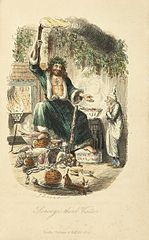With all the recent publicity about the so-called “war on Christmas”, as it has weirdly become the “holiday that dare not speak its name”, it is easy to forget that there has always been a war on Christmas, ever since Herod. The forces of revolution are the obvious culprits, who need not again be identified here, but it is probably less well known that the celebration of Christmas was forbidden in 1644 in England by the Puritan government; it was regarded as “too pagan”. The novella, A Christmas Carol by Charles Dicken, was the force that restored what we today consider the “traditional” way of celebrating Christmas. In the process, he also secularized it, a process still incomplete.

In the older European tradition, Advent, the period leading up to Christmas, was a time for fasting. Christmas Eve was a day of abstinence, hence the customary fish dinner on that day. That was followed by the famous twelve days of Christmas, after which gifts would be exchanged.
Curiously, there has arisen in our time a movement that claims to be restoring Tradition in the West, while denying all its specific Traditional elements. This countertradition, for that is what it is, thinks it is being edgy by rejecting that Tradition on the grounds that it is pagan, which it claims to be the authentic tradition. Unfortunately, virtually all they know of that pseudo-tradition is what has been preserved in the real Tradition or else documented by monks.
The joke is that this countertradition is not at all pagan, but actually aligns itself with the Puritans of England and related groups; they even use the same arguments against the Medieval Tradition. The joke would be funny were they not so full of passionate intensity. As we pointed out many times, virtually all people adopt a world view based on affinity: viz., what their friends think, what makes them feel good, what they are accustomed to, their inclinations and aversions, and so on. A fortiori, if a choice needs to be made between an authentic tradition and personal perversity, the latter will most often win out.
Hence, the true war against Christmas if fought first in our own hearts. This is denied by no authentic tradition, even Evola writes the same thing. However, it is up to us to move this along with specifics. Here is an important little exercise in this spiritual combat; it trains us to see beyond affinity, or our arbitrary likes and dislikes, and to see things objectively, as they are, and without illusion. This exercise is a requirement for initiates, whether Christian, pagan, Hindu, and so on. What follows was originally written by Lorenzo Scupoli and collected in his Spiritual Combat. The version provided here is based on Scupoli, but edited by Nicodemus of the Holy Mountain and further revised by Theophan the Recluse.
The reason why we have wrong judgment of things is that we do not look deeply into them to see what they are, but conceive a liking for them or a dislike of them from the very first glance, judging by appearances. These likes and dislikes prejudice our mind and darken it; and so it cannot form a right judgment of things as they really are. So, my brother, if you wish to be free of this prelest, or spiritual delusion, in your mind, keep strict attention over yourself; and when you see a thing with your eyes, or visualise it in your mind, keep a firm grip on your desires and do not allow yourself at the first glance either to conceive a liking for the thing or a dislike for it, but examine it in a detached way with the mind alone. Unobscured by passion, the mind then remains in a state natural to it, which is free and pure, and has the possibility to know the truth and to penetrate in to the depths of a thing, where evil is often concealed under a deceptively attractive exterior and where good is sometimes hidden under a bad appearance.
“Ye shall know them by their fruits. Do men gather grapes of thorns, or figs of thistles?”
Another is time. Where we may not be intelligent enough or too deceived to initially see the truth, we may examine the results and whether or not they match up with the claims.
Of course the modern world will always claim “the bad fruit is only because we have not completely destroyed our enemies and just need more progress/government/destruction of tradition.”
Excellent post. It is a most difficult exercise, detaching your feelings from any given object, but most neccesary for true progress in the spiritual life. I’m writting a brief article about the secularization and degradation of Christmas, if you don’t mind I’ll post the link.